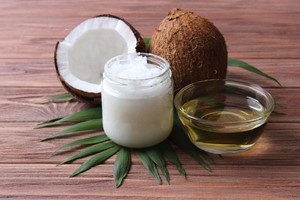Coconut oil, derived from the innermost part of coconuts (Cocos nucifera), stands out among oils for its unique properties. Being solid at room temperature, it's a rich, plant-based oil widely recognized for its potential health benefits. However, it also contains a significant proportion of saturated fat, raising concerns regarding its impact on health. Here, we delve into the diverse health attributes of coconut oil while addressing associated risks and considerations.
Understanding Coconut Oil:
Coconut oil is hailed for its various potential health benefits, particularly in enhancing skin and hair texture. Nonetheless, its high saturated fat content has led to conflicting views regarding its overall health impact. Preliminary research, however, suggests promising avenues for exploration. Coconut oil may facilitate fat burning and possess antimicrobial and anti-inflammatory properties beneficial for oral health.
May Aid in Weight Management:
Recent studies indicate that incorporating medium-chain triglycerides (MCTs) into one's diet, such as those found in coconut oil, could contribute to significant reductions in body weight, particularly when combined with a low-calorie ketogenic diet. While coconut oil's fat content primarily consists of MCTs, research suggests it may exert similar effects to MCT oil in influencing fat burning. Nonetheless, many nutrition experts remain cautious about advocating coconut oil as a primary tool for weight management until further research substantiates its efficacy.
May Enhance Skin Health:
Coconut oil has garnered attention for its potential in treating various skin conditions. Studies reveal its efficacy in promoting wound healing, addressing dry skin concerns, and alleviating inflammation. Notably, individuals with eczema who applied extra virgin coconut oil experienced significant improvements. Its anti-inflammatory properties and ability to act as a protective barrier against environmental stressors make it a compelling option for skincare.
May Boost Hair Health:
Incorporating coconut oil into hair care routines is a common practice owing to its demonstrated benefits. Research suggests that applying coconut oil to the scalp can reduce protein loss in hair, outperforming other oils in protecting hair health. Moreover, coconut oil application may decrease flaking and foster a healthy scalp environment by promoting beneficial scalp bacteria, thus potentially aiding in the prevention of dandruff.
May Prevent Cavities:
Oil pulling, a practice similar to using mouthwash, has gained traction as a holistic approach to oral health. Coconut oil, often used in this practice, exhibits antibacterial and plaque-reducing properties, thus potentially lowering the risk of cavities. Research indicates that oil pulling with coconut oil enhances oral hygiene, reduces bacteria and plaque, and mitigates the likelihood of developing cavities.
Nutritional Profile of Coconut Oil:
A 1-tablespoon serving of coconut oil contains approximately 121 calories and 13.5 grams of fat, constituting 17% of the Daily Value (DV). It contains no sodium, carbohydrates, sugars, or protein.
Risks of Coconut Oil:
While coconut oil is generally considered safe for consumption, individuals with allergies, particularly to tree nuts, should exercise caution. Despite being classified botanically as a fruit, coconut is often labeled as a nut by food manufacturers, potentially causing confusion among consumers. Moreover, the prevalence of coconut allergies appears to be rising, warranting careful consideration, especially among individuals with pre-existing allergies.
Additionally, the high saturated fat content of coconut oil prompts concerns regarding its impact on heart health. Some studies suggest that diets high in saturated fats may increase the risk of heart disease in certain individuals. However, consuming two tablespoons of coconut oil daily might elevate HDL cholesterol levels (good cholesterol). Given these conflicting findings, consulting a healthcare provider or registered dietitian before incorporating coconut oil into one's diet is advisable.
Tips for Consuming Coconut Oil:
Due to its high fat content, coconut oil consumption should be moderated, adhering to the guidelines outlined by the U.S. Dietary Guidelines. Limiting intake to approximately one tablespoon daily is recommended, ensuring that saturated fats constitute less than 10% of the daily caloric intake. Various methods can be adopted to incorporate coconut oil into one's diet, such as blending it into smoothies, using it for baking, or adding it to hot cereals.
Coconut oil stands as a versatile oil with numerous potential health benefits, ranging from weight management to skincare and oral health. While its saturated fat content warrants caution, preliminary research underscores its promising attributes. As with any dietary addition, consulting healthcare professionals is crucial to ascertain its suitability and mitigate associated risks, ensuring informed and optimal integration into one's lifestyle.
By: Sherri Gordon
https://www.health.com/













